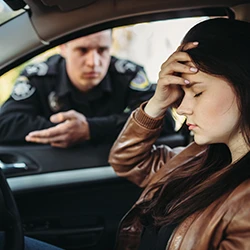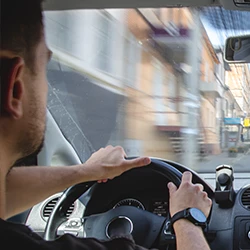Driving under the influence of drugs is illegal in every state, but the specific criteria for what constitutes "under the influence" varies from one state to another.
As a legal attorney with years of experience dealing with DUI cases, I will tell you how to navigate the legal landscape and make informed decisions to ensure your safety and the safety of others on the road.
Quick Summary
- Driving under the influence of drugs can lead to DUI charges and pose serious risks.
- Some states have enacted "Per Se" drugged driving laws, making driving illegal with any detectable amount of certain drugs in one's system.
- Drugged driving carries steep penalties, including fines, imprisonment, and license suspension, which may be augmented if the offense causes an injury or death.
Can I Get A DUI For Drugged Driving?

Based on previous cases I've worked on, it's very important to understand the risks associated with taking prescription drugs and driving. That is why many states have laws making driving illegal while impaired by any substance, including prescription drugs. The impairing effects of various drugs can lead to motor vehicle crashes and fatally injured drivers.
In 2009, more than 18 percent of fatally injured drivers tested positive for at least one illegal or prescription drug [1].
What Does DUI Mean?

Driving under the influence of drugs, whether marijuana-impaired driving or prescription medications, is dangerous and poses a significant risk to public safety. The impairing effects of these substances can lead to accidents and severe consequences for the driver, passengers, and other road users.
Drugged Driving "Per Se" Laws
"Per se" drugged driving laws make driving illegal with any detectable amount of certain drugs in one's system [3]. Different states have their laws against drug-impaired driving.
Understanding the difference between "per se" and other DUI laws is vital. Per se DUI laws concentrate on the presence of drugs in the driver's system, whereas other DUI laws require prosecution to prove impairment. Familiarizing yourself with the laws in your jurisdiction is key to maintaining the lawful operation of your vehicle.
Related Article: Can I Drive on Adderall?
Impairing Effects of Various Illegal Drugs

On the other hand, cocaine and methamphetamine use can lead to aggressive and reckless behavior while driving.
According to the CDC, consuming cannabis can distort perception, decrease reaction time, distort vision, impair coordination, and make it difficult to make decisions. All of this can greatly affect a person's driving ability.
- Dana Brent Brown, Managing Attorney at The Law Offices of Ossie Brown
Prescription & Over-the-Counter Drugs
Prescription and over-the-counter drugs can also lead to impairment while driving, posing a risk to public safety. It is crucial to check warning labels and consult a pharmacist to ensure you take medications safely and responsibly.
Common prescription and OTC drugs affecting a driver's ability to operate a vehicle safely include benzodiazepines, opioids, and other medications that can cause drowsiness, dizziness, and impair cognitive functioning [4].
Legal Consequences of Drugged Driving
Driving under the influence of marijuana, alcohol, or other controlled substances can lead to serious charges.
Offenders typically face penalties similar to those for an alcohol-related DUI:
- First Offense: A first offense of driving under the influence of marijuana is typically classified as a misdemeanor. Offenders may be subject to 10 days to 6 months of jail time.
- Second Offense: A second marijuana DUI is usually categorized as a misdemeanor. Offenders might receive a sentence of 30 days to 6 months of jail time.
- Third Offense: A third marijuana DUI is typically considered a felony. In that case, those charged can face up to 5 years in jail.
- Fourth and Subsequent Offenses: A fourth offense of driving under the influence of marijuana is also generally classified as a felony. Offenders may be subject to 10 to 30 years of imprisonment.
Repeated offenders who received drugged driving charges may have difficulties obtaining employment, may be required to install an ignition interlock device in their vehicle, and could face steep insurance premiums. It is always advisable to drive sober and responsibly.
Zero Tolerance laws prohibit driving with any detectable levels of specific drugs in the body. These laws are primarily designed for illegal substances. If a drug is illegal to possess or use, it is typically considered reasonable to forbid driving under the influence of that drug. It's worth noting that not all states have implemented these laws.
Related Article: Driving Under Restraint (DUR)
See all related personal injury and accident lawsuits our lawyers covered so far.
FAQs
1. What prescriptions are dangerous to drive with?
Prescriptions that are dangerous to drive include benzodiazepines, opioids, antidepressants, antihistamines, and muscle relaxants. These medications can cause drowsiness, dizziness, impaired coordination, slowed reaction times, impaired judgment, and blurred vision, impairing your ability to drive safely.
2. Can I refuse a drug test during a DUI stop for drugged driving?
Refusing a drug test during a DUI stop may result in immediate penalties, such as license suspension, and can be used as evidence against you in court.
3. Can I get a DUI for driving high on medical marijuana?
Yes, you can get a DUI for driving high on medical marijuana. Just like alcohol, driving while impaired by marijuana is a violation of the law and may result in a DUI charge.
Contact a Dui Lawyer Today and Get Your Legal Representation
If you or a loved one are confronted with a drugged driving charge, seeking legal representation from a skilled DUI lawyer is vital. The DUI lawyers at Schmidt & Clark, LLP possess comprehensive knowledge of DUI laws and regulations, which can be intricate and differ across states. They specialize in dealing with cases related to driving under the influence and can offer a sound defense to DUI charges involving drugs.
Our DUI lawyers will ensure that your rights are safeguarded throughout the legal process, provide counsel on what to say and do to prevent self-incrimination and secure your interests, and conduct a thorough evaluation of your case, including an examination of the evidence against you, to detect any potential vulnerabilities or defenses.
References:
- https://nida.nih.gov/research-topics/cannabis-marijuana
- https://www.addictioncenter.com/addiction/driving-influence-dui/
- https://www.nhtsa.gov/sites/nhtsa.gov/files/811317.pdf
- https://misuse.ncbi.nlm.nih.gov/error/abuse.shtml

 Published by
Published by 